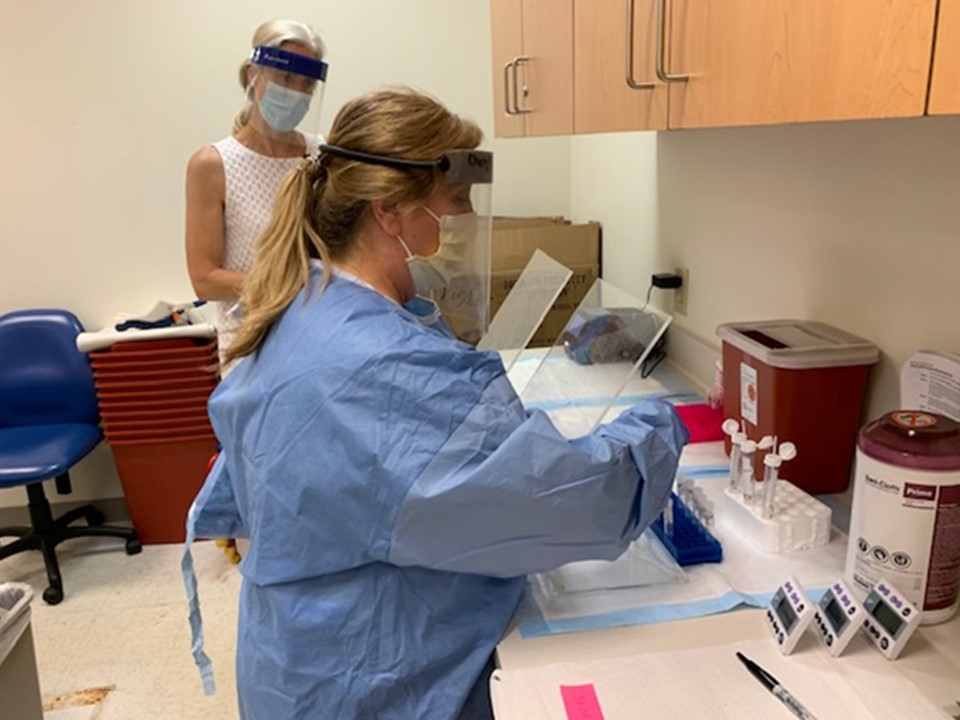NIH Delivering New COVID-19 Tests Validated by Georgia CTSA Leaders

The National Institutes of Health (NIH) Rapid Acceleration of Diagnostics (RADx) initiative has awarded contracts to seven biomedical diagnostic companies whose innovative technologies will increase the availability of COVID-19 tests by millions per week as early as September 2020. While expanding the nation’s testing capacity, these testing technologies use different methods including more convenient sampling, such as saliva testing, while some technologies provide results within minutes at the point of care including schools, offices, and nursing homes.
Two of Georgia CTSA’s leaders head up the NIBIB-funded Atlanta Center Microsystems Engineered Point of Care Technologies (ACME POCT) which was selected by the NIH, along with their institutions - Emory, Georgia Tech, and Children’s Healthcare of Atlanta - to test and validate some of the most promising technologies for COVID-19 diagnostic tests.
“The RADx-Tech program is working at warp speed to deliver millions of COVID-19 diagnostic tests to our nation and the world in the next few months. The combined teams from Emory and Children’s are working together in our Atlanta Center for Microsystems Engineered Point-of-Care Technologies (ACME POCT) to validate new tests both in the laboratory setting and with patients,” says Greg Martin, MD, MSc, Co-Principal Investigator of ACME POCT, Professor of Medicine at Emory University, Chair of Critical Care for Grady Health System, and Georgia CTSA Clinical Research Centers (GCRCs) Program Director from 2015 through March 2020.
Wilbur Lam, MD, PhD is the Principal Investigator of ACME POCT, attending physician in the Aflac Cancer and Blood Disorders Center at Children’s, and Georgia Clinical & Translational Science Alliance (Georgia CTSA) Innovation Catalyst Program Director. Lam comments, “The majority of these technologies selected to receive support for manufacturing and scale up were directly validated by our center. It’s a combination of our clinical expertise, as well as our patient population, and our expertise in diagnostic technology that has enabled the NIH to entrust us with this really important responsibility to determine what the best tests are for the country. We’re doing that, and I’m very proud of our work to help stop the spread of this virus.”
Lam, Martin, and the team will continue to test and validate additional diagnostic technologies in the coming months. Testing technologies selected for scale up could be used at home or in a clinic, while some tests may be a traditional laboratory test but with much faster results. Any investigator or company who has a good idea for a COVID-19 diagnostic test can apply and be selected to go through a “Shark Tank”-like vetting process by the NIH.
“When it comes to the scientific and experimental aspects, our team is doing test validation on every single test that was selected to go to the next phase. It’s a combination of multiple things that we are capable of doing well. At Emory, we have our virus experts, our virologists, who are researchers that take these technologies in our biosafety level 3, BSL-3, labs and determine if the new device can detect the virus as you continue to dilute it to determine how sensitive the test is. Our lab transforms from being a research lab to being a diagnostic testing lab. Additionally, our pathologists are constantly collecting patient samples, and we’ve created a large biobank. So now in parallel to what goes into the biosafety BSL-3 lab where one of our scientists is reviewing if a diagnostic test can detect the coronavirus, we can also expose a test that’s being evaluated to patient samples that we have stored that are comprised from patients at Emory and Children’s Healthcare of Atlanta,” adds Lam.
“We also have two drive-thru testing facilities. One site is at Children’s on Satellite Boulevard in Atlanta where those who have a doctor’s referral can get tested with the standard test. We also recruit those patients as research subjects for tests that are under evaluation. So, we can perform a back-to-back comparison between the results of the standard test and the test under evaluation, and we can collect more samples. We’ve already recruited over 600 participants. The second site is an Emory Healthcare site at Northlake Mall to collect adult samples.”
To learn more about the initial seven biomedical diagnostic companies awarded contracts for scale up, manufacturing, and delivery of their innovative testing technologies, read the NIH press release.
Georgia CTSA’s multi-site Georgia CTSA Clinical Research Centers (GCRCs) is a multilayered, flexible, and geographically distributed network created to meet the needs of translational and clinical investigators from Emory University, MSM, UGA, Georgia Tech, and Children’s Healthcare of Atlanta (Children’s). The GCRCs offers dedicated space and a variety of resources ranging from core laboratory services to a bionutrition unit to support the research process at a subsidized cost. Clinical sites, including nursing services, are located at Emory University Hospital, Grady Memorial Hospital, UGA, MSM, Children’s, and Emory University Midtown.
The Georgia CTSA is a statewide partnership between Emory, MSM, Georgia Tech, and UGA and is one of over 60 in a national consortium striving to improve the way biomedical research is conducted across the country. The consortium, funded through the National Center for Advancing Translational Sciences (NCATS) and the National Institutes of Health's Clinical and Translational Science Awards, shares a common vision to translate laboratory discoveries into treatments for patients, engage communities in clinical research efforts, and train the next generation of clinical investigators. For more information, click here.